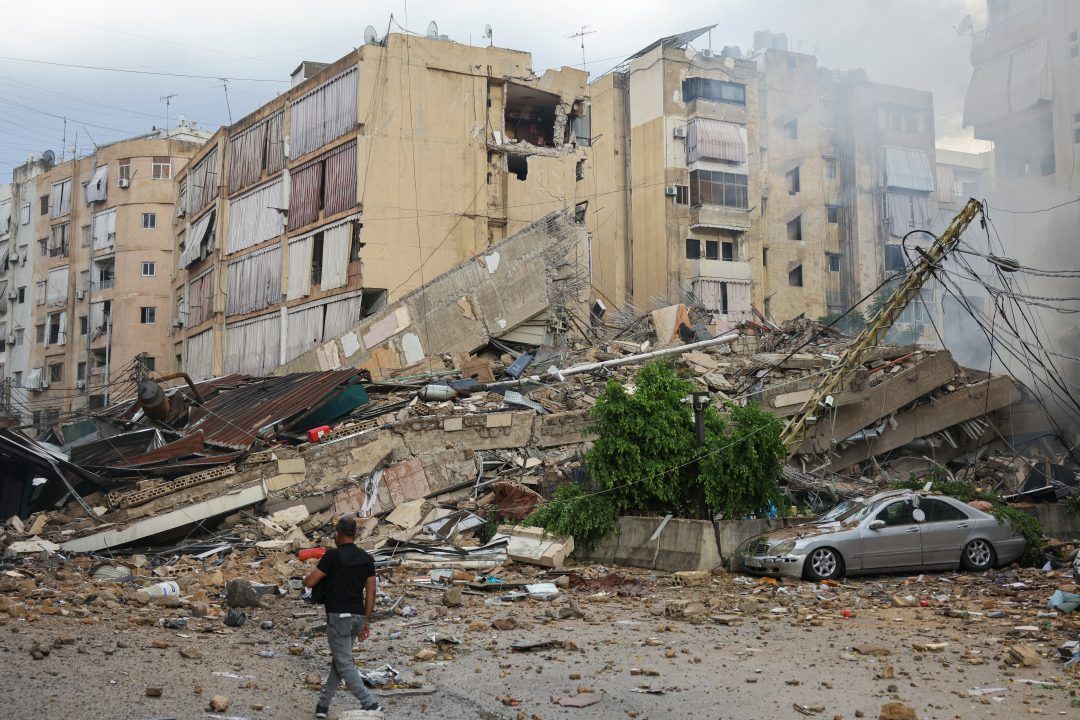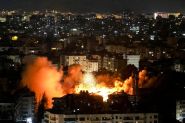- Home
- War in the Middle East
- Uncertainty Shrouds Israel's Invasion of Lebanon

©ANWAR AMRO / AFP
Uncertainty is mounting about whether Israel has initiated its invasion of Lebanon, whilst questions swirl about precisely how Israel intends to prosecute this war.
Uncertainty is mounting over the precise details of Israel’s invasion of Lebanon following the Israeli military’s announcement, in the early hours of Tuesday, of the commencement of “limited, localized and targeted” ground operations.
This invasion would mark the first time Israeli ground forces have openly operated on Lebanese soil since 2006 - although reports have emerged in recent days that Israeli special forces have been making raids into Lebanon over the past week in preparation for a broader offensive.
Yet conflicting reports are swirling regarding the exact details of the invasion.
It remains unclear whether the invasion has begun in earnest. In the early hours of the morning the Israeli military released a statement saying “a few hours ago, the IDF began limited, localized, and targeted ground raids”, later reporting “heavy clashes” with Hezbollah inside Lebanon.
However, both UNIFIL and the Lebanese army have denied that any incursions have taken place, with Hezbollah also issuing a statement this morning denying any such incident.
Despite this, Hezbollah reaffirmed that its fighters are prepared to confront any incursion if it occurs.
An Israeli Military official, speaking to the Hill on the condition of anonymity, confirmed these reports, but stated that Israeli troops are now positioned mere yards away from the border, and are prepared to enter at any moment.
Reports also emerged late last night that the Lebanese army pulled back from the Blue Line - the UN-mediated demarcation line on the border between Lebanon and Israel - to positions 5km within Lebanese territory ahead of an Israeli incursion.
Although army officials speaking to This is Beirut have dismissed these reports, instead clarifying that the army remains on the Blue Line, but that they have redeployed their forces in order to position more experienced combat-ready units on the border whereas less experienced units have been pulled back within Lebanese territory.
The Israeli military has announced plans to confront Hezbollah through "limited, localized, and targeted ground raids" into Lebanon.
The Biden administration has been pressuring Israel against launching a full-scale invasion, as it seeks to steer the region away from the prospect of all out war.
According to Axios, over the last 48 hours intense discussions have been ongoing between the American and Israeli officials to clarify the extent of Israel’s plans in Lebanon, with an agreement reportedly reached recognizing Israel's “need” to clear Hezbollah infrastructure away from the border.
As a result, it appears that the Israeli military is intending to degrade Hezbollah's capabilities through targeted raids against its fighters and military infrastructure.
According to Khalil Helou, a former General of the Lebanese army, this represents a similar strategy to the one they have displayed in Gaza. “They have created a buffer zone on the edges of the territories, and then launch incursions from that zone to targeted points. They raid it massively, using infantry, bombing from the air and armored columns.”
These raids may last from several days to several weeks and then they return to their positions, adds Helou.
Their hope is to weaken Hezbollah sufficiently, enabling residents to return to northern Israel without getting bogged down in a grinding insurgency.
Yet, on Tuesday, the Israeli military’s Arabic language spokesman announced the evacuation of more than two dozen settlements in southern Lebanon, whilst urging the Lebanese to “immediately head to the north of the Awali river.”
The Awali river is situated 60 miles into Lebanese territory, north of both the Litani river and Saida, - perhaps suggesting that raids will be ongoing deep into Lebanese territory.
However, questions remain how effective such a strategy can be.
In Gaza, the Israeli military has had to repeatedly clear the same areas, at an immense human cost, as Hamas has been afforded the opportunity to reconstitute and redeploy following Israeli withdrawals.
In the 2006 war, the Israelis frequently found themselves under fire from positions that they believed they had cleared, as Hezbollah utilized their immense tunnel network in southern Lebanon to frequently redeploy behind Israeli forces.
However, Helou believes that the Israeli strategy will have been developed with a keen awareness of Israel’s humbling military experiences in Lebanon.
Helou believes they are likely currently deploying special forces to eliminate the possibility of ambushes, and Hezbollah's anti-tank missile positions - which were so effective against Israel in 2006.
Whilst using artillery to prepare the ground for the incursion and scope out where Hezbollah is returning fire from.
He predicts that Israel may occupy a thin strip along the border which they will use as a base to launch deep, likely very deadly, raids into Lebanon to destroy Hezbollah capabilities.
This will allow it to achieve its war aims of providing protection to the residents of northern Israel, whilst limiting their exposure to a grueling insurgency campaign like that between 1982-2000.
“It won't be a real occupation like we saw before 2000, but we will find ourselves in an endless war unless Hezbollah makes concessions, so we can find a sustainable peace.”
Although he warns that if Hezbollah collapses quickly, the Israelis may exploit that and push further into Lebanon in order to exploit concessions and claim for themselves a larger buffer zone.
Uncertainty is mounting over the precise details of Israel’s invasion of Lebanon following the Israeli military’s announcement, in the early hours of Tuesday, of the commencement of “limited, localized and targeted” ground operations.
This invasion would mark the first time Israeli ground forces have openly operated on Lebanese soil since 2006 - although reports have emerged in recent days that Israeli special forces have been making raids into Lebanon over the past week in preparation for a broader offensive.
Yet conflicting reports are swirling regarding the exact details of the invasion.
It remains unclear whether the invasion has begun in earnest. In the early hours of the morning the Israeli military released a statement saying “a few hours ago, the IDF began limited, localized, and targeted ground raids”, later reporting “heavy clashes” with Hezbollah inside Lebanon.
However, both UNIFIL and the Lebanese army have denied that any incursions have taken place, with Hezbollah also issuing a statement this morning denying any such incident.
Despite this, Hezbollah reaffirmed that its fighters are prepared to confront any incursion if it occurs.
An Israeli Military official, speaking to the Hill on the condition of anonymity, confirmed these reports, but stated that Israeli troops are now positioned mere yards away from the border, and are prepared to enter at any moment.
Reports also emerged late last night that the Lebanese army pulled back from the Blue Line - the UN-mediated demarcation line on the border between Lebanon and Israel - to positions 5km within Lebanese territory ahead of an Israeli incursion.
Although army officials speaking to This is Beirut have dismissed these reports, instead clarifying that the army remains on the Blue Line, but that they have redeployed their forces in order to position more experienced combat-ready units on the border whereas less experienced units have been pulled back within Lebanese territory.
“Limited, Localized, and Targeted”
The Israeli military has announced plans to confront Hezbollah through "limited, localized, and targeted ground raids" into Lebanon.
The Biden administration has been pressuring Israel against launching a full-scale invasion, as it seeks to steer the region away from the prospect of all out war.
According to Axios, over the last 48 hours intense discussions have been ongoing between the American and Israeli officials to clarify the extent of Israel’s plans in Lebanon, with an agreement reportedly reached recognizing Israel's “need” to clear Hezbollah infrastructure away from the border.
As a result, it appears that the Israeli military is intending to degrade Hezbollah's capabilities through targeted raids against its fighters and military infrastructure.
According to Khalil Helou, a former General of the Lebanese army, this represents a similar strategy to the one they have displayed in Gaza. “They have created a buffer zone on the edges of the territories, and then launch incursions from that zone to targeted points. They raid it massively, using infantry, bombing from the air and armored columns.”
These raids may last from several days to several weeks and then they return to their positions, adds Helou.
Their hope is to weaken Hezbollah sufficiently, enabling residents to return to northern Israel without getting bogged down in a grinding insurgency.
Yet, on Tuesday, the Israeli military’s Arabic language spokesman announced the evacuation of more than two dozen settlements in southern Lebanon, whilst urging the Lebanese to “immediately head to the north of the Awali river.”
The Awali river is situated 60 miles into Lebanese territory, north of both the Litani river and Saida, - perhaps suggesting that raids will be ongoing deep into Lebanese territory.
Will it work?
However, questions remain how effective such a strategy can be.
In Gaza, the Israeli military has had to repeatedly clear the same areas, at an immense human cost, as Hamas has been afforded the opportunity to reconstitute and redeploy following Israeli withdrawals.
In the 2006 war, the Israelis frequently found themselves under fire from positions that they believed they had cleared, as Hezbollah utilized their immense tunnel network in southern Lebanon to frequently redeploy behind Israeli forces.
However, Helou believes that the Israeli strategy will have been developed with a keen awareness of Israel’s humbling military experiences in Lebanon.
Helou believes they are likely currently deploying special forces to eliminate the possibility of ambushes, and Hezbollah's anti-tank missile positions - which were so effective against Israel in 2006.
Whilst using artillery to prepare the ground for the incursion and scope out where Hezbollah is returning fire from.
He predicts that Israel may occupy a thin strip along the border which they will use as a base to launch deep, likely very deadly, raids into Lebanon to destroy Hezbollah capabilities.
This will allow it to achieve its war aims of providing protection to the residents of northern Israel, whilst limiting their exposure to a grueling insurgency campaign like that between 1982-2000.
“It won't be a real occupation like we saw before 2000, but we will find ourselves in an endless war unless Hezbollah makes concessions, so we can find a sustainable peace.”
Although he warns that if Hezbollah collapses quickly, the Israelis may exploit that and push further into Lebanon in order to exploit concessions and claim for themselves a larger buffer zone.
Read more




Comments